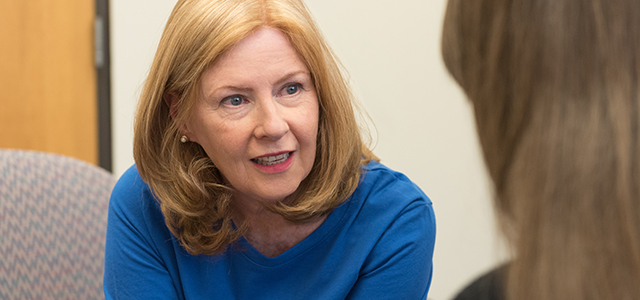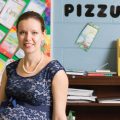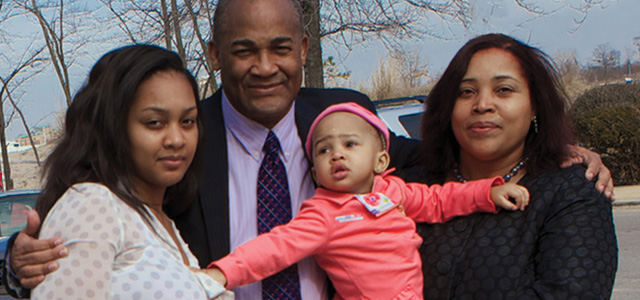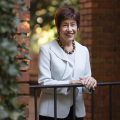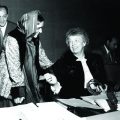Young homeless mothers learn critical lessons in prenatal and infant care through a texting program introduced by the College of Nursing’s Maureen Byrnes.
Having a baby can be a bewildering experience for anyone. But if you’re young and homeless, the prospect can be downright terrifying. Motherhood prompts so many questions, and trustworthy information can be hard to find.
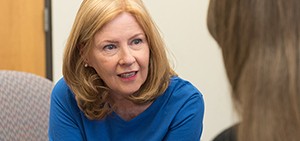 In spring 2013, Maureen Byrnes, an assistant nursing professor and certified nurse midwife, launched a project to make the experience a little less daunting. Byrnes helped new mothers, ages 18-21, at a Newark homeless shelter enroll in a service that provides text messages about how to keep babies healthy, before and after birth.
In spring 2013, Maureen Byrnes, an assistant nursing professor and certified nurse midwife, launched a project to make the experience a little less daunting. Byrnes helped new mothers, ages 18-21, at a Newark homeless shelter enroll in a service that provides text messages about how to keep babies healthy, before and after birth.
Text4baby, which launched in 2010, is an education campaign designed to promote maternal and child health. Women receive three free texts a week, with messages timed to match the woman’s due date or the baby’s date of birth and continue through the baby’s first year of life.
So a woman in her first trimester might receive this message: “Morning sickness may be caused by a change in your hormones. Try eating crackers or dry cereal.
Eat small meals often. Don’t go without eating.”
A new mom, on the other hand, might receive a text that says, “Your baby’s mouth needs cleaning now — even before the first tooth! Wipe your baby’s gums each day with a wet washcloth or use a soft baby toothbrush.”
When Byrnes first learned about Text4baby as a student in Seton Hall’s doctoral nursing program, she was intrigued. She and her students began offering their clients the option to enroll. One morning, as Byrnes was driving to Seton Hall, a new idea came to her. Why not make it accessible to homeless women?
No one had implemented Text4baby within a homeless population before. But Byrnes could already see the potential benefits. “It’s a perfect platform to get evidence-based health information to them in a manner they’ll utilize,” she says. “You could hand a young mother a brochure; that doesn’t mean she’s going to read it. But they do read text messages,” she says.
Byrnes had also recently learned a striking statistic: African-American babies born in New Jersey are 3.5 times as likely to die before their first birthday as white infants. This disparity exists, at least in part, because of a lack of access to health information.
Between May and August 2014, Byrnes made weekly visits to Covenant House, a homeless shelter in Newark, and Raphael’s Life House, an affiliated residence for new or expectant mothers in nearby Elizabeth. She met with pregnant women and new mothers to talk to them about the service and recruit them to join. For the women who didn’t already have mobile phones, Byrnes connected them with a federal assistance program that provides cellphones to people who are eligible.
When Byrnes proposed the project to Meghan Leigh, associate site director of Covenant House, Leigh wasn’t sure if Text4baby would appeal to the women at the shelter. She need not have worried. “The girls weren’t hesitant,” she says. Of the 12 women eligible for enrollment at Raphael’s Life House, 10 signed up. “I thought that was astounding,” Byrnes says. What’s more, nine of those moms agreed to become ambassadors and share the service with others.
The messages seem to have a real impact, and Leigh says she was surprised to hear women referencing the texts. For example, a mother might tell a staff member, “Text4baby reminded me I have to get the baby shots, so can you help me make an appointment?”
Text messages can’t provide all the information these young women need, Leigh says. But they provide some basic education. “It keeps them mindful,” she says. “It proved to be really beneficial to our young mothers.”
Of course, part of the project’s success might be due to Byrnes. The women seemed to respond to her, Leigh says. “They felt really loved, and she really wrapped her arms around them to make them feel confident about their mothering and their parenting abilities.”
In February, Byrnes presented her findings at the Care4 International Scientific Nursing and Midwifery Congress at the University of Antwerp in Belgium.
For Byrnes, the project was a chance to give back to people living in the community where she was raised. Byrnes grew up in Newark, too. She was never expected to go to college, let alone receive a doctorate degree. “Education changes everything. This project is a full circle — a gift of gratitude for everything I’ve been given,” she says.
Cassandra Willyard is a freelance writer in Madison, Wisconsin.

